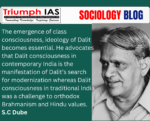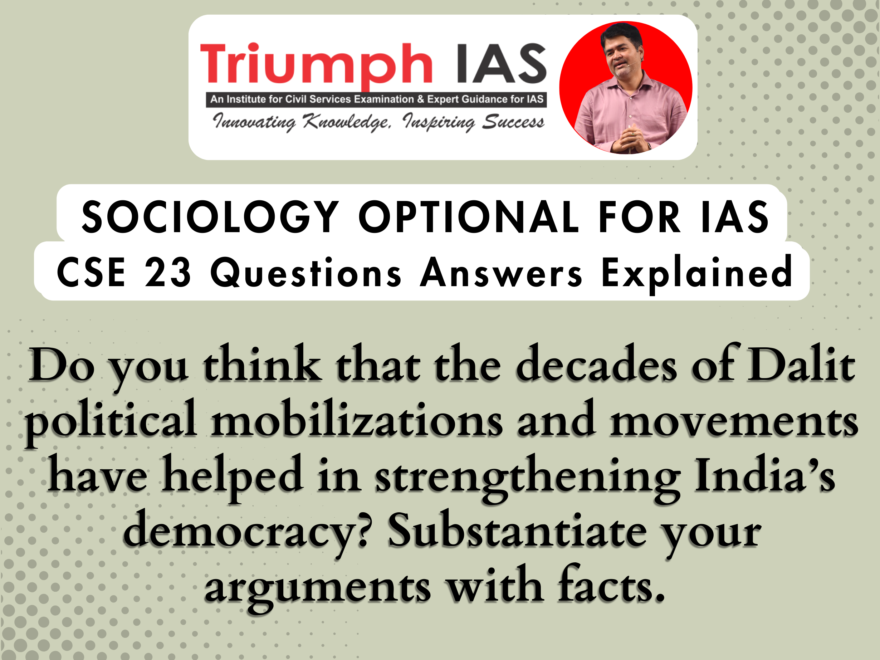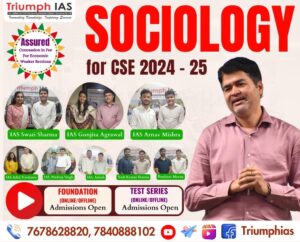Do you think that the decades of Dalit political mobilizations and movements have helped in strengthening India’s democracy? Substantiate your arguments with facts.
Section: B.
Sociology Paper 2023 Analysis.
Relevant for Paper-2 : Social Movements in Modern India: Dalit movements
Question- 7 (A): Do you think that the decades of Dalit political mobilizations and movements have helped in strengthening India’s democracy? Substantiate your arguments with facts. (20 Marks)
|
Introduction: Brief idea about Dalit Political Mobilisation Main Body: Role of Dalit political mobilizations and movements in strengthening India’s democracy and then highlighting few challenges associate Conclusion: Despite criticism it is helping in democratic Introduction |
Introduction
- In his work “Annihilation of Caste,” B.R. Ambedkar emphasized the crucial necessity of politically mobilizing Dalits to address the historical injustices they have faced. Subsequently movements and mobilizations have significantly influenced the democratic evolution of India.
- Phases of Dalit Mobilisation :
-
- Phase and focus of during the period from the 1920s to the 1950s, Dalit mobilization was predominantly cantered on issues such as securing entry into Hindu temples, challenging Manusmriti (an ancient Hindu text), abandoning native priests influenced by Brahmanic values, and generating literature addressing caste concerns.
- In contemporary India, Dalit identity has shifted towards the pursuit of rights, justice, and equality, rather than a confrontation with Hinduism.
-
- According to Andre Béteille, the current Dalit mobilization is primarily motivated by political interests, moving away from a focus on a discriminatory cultural history.

- According to Andre Béteille, the current Dalit mobilization is primarily motivated by political interests, moving away from a focus on a discriminatory cultural history.
Main Body
Dalit political mobilizations and movements: strengthening India’s democracy Top of Form
-
- Political representation: Dalit movements have contributed to increased political representation of Dalits. Reservations and affirmative action policies have led to the inclusion of Dalits in political institutions, strengthening democratic ideals of representation.
- For e.g. Bahujan Samaj Party is a party that primarily represents the Dalits.
- For e.g. Bahujan Samaj Party is a party that primarily represents the Dalits.
- Awareness about Social Inequalities: Dalit movements have raised awareness about social inequalities, leading to increased education and political consciousness among the Dalit population. An educated and informed citizenry is essential for a thriving democracy.
- Legal reforms: Dalit movements have been instrumental in advocating for and influencing legal reforms. Landmark legislations like the Scheduled Castes and Scheduled Tribes (Prevention of Atrocities) Act, 1989, and the implementation of reservation policies demonstrate the impact of these movements on the legal framework.
- Social justice: Dalit political mobilizations have played a crucial role in challenging social hierarchies and promoting social empowerment. Empowered communities are more likely to participate actively in the democratic process.
- Shift in Voting Patterns: Post-independence, Dalits have shifted from being passive voters to actively participating in the democratic process, exercising their voting rights more assertively. This shift reflects a growing awareness and engagement with the democratic institutions.
- Societal Integration: Initiatives promoting inter-caste marriages and social gatherings in states like Tamil Nadu indicate progress towards a more integrated society. This aligns with Durkheim’s vision of a cohesive society unified by social solidarity.
- Cultural identity: The mobilization of Dalits has played a crucial role in safeguarding and fostering the cultural identity of the community. It has contributed to an increased recognition and comprehension of Dalit culture and history, fostering a greater appreciation for their heritage.
- Political representation: Dalit movements have contributed to increased political representation of Dalits. Reservations and affirmative action policies have led to the inclusion of Dalits in political institutions, strengthening democratic ideals of representation.
Challenges and Concerns:
-
- Resistance from Traditional Power Structures: Dalit mobilization often challenges deeply ingrained social hierarchies and the power structures of the caste system. This can result in resistance from dominant castes, leading to social tensions and conflicts.
- Political Instrumentalization: Dalit movements can sometimes be co-opted or manipulated by political parties for their own gains. This can lead to the dilution of genuine concerns and the instrumentalization of Dalit issues for electoral purposes.
- Dipankar Guptta highlights that caste based political parties that are based on caste identities are harmful to the development of the country as they promote a narrow and divisive agenda and undermine the potential for unity and progress.
- Intra-Dalit Divisions: While Dalits share a common identity in terms of historically being marginalized, there can be internal divisions based on sub-castes and regional variations. Intra-Dalit conflicts may emerge, potentially undermining the unity needed for effective mobilization.
- Violence and Retaliation: Dalit mobilization sometimes triggers violent reactions from conservative elements within society. Dalit activists and community members may face backlash and physical harm, making it difficult to sustain and advance their cause.
- Limited Institutional Support: The legal and institutional framework in some regions may not be fully supportive of Dalit rights. Inadequate implementation of protective laws and policies can hinder the progress of Dalit mobilization.
-
- Lack of Intersectionality: Dalit mobilization sometimes focuses primarily on caste-related issues, potentially neglecting other intersecting factors such as gender, class, and religion. An intersectional approach is crucial for addressing the diverse challenges faced by Dalit individuals.
Conclusion
Despite criticism it can be concluded political mobilisation of Dalits have ensured their participation in democratic exercise. Reservation of seats in assemblies, parliament and local self-bodies have ensured sufficient Dalit representation. Over all it has made our society and polity more democratic.
Related Blogs…
 |
 |

To master these intricacies and fare well in the Sociology Optional Syllabus, aspiring sociologists might benefit from guidance by the Best Sociology Optional Teacher and participation in the Best Sociology Optional Coaching. These avenues provide comprehensive assistance, ensuring a solid understanding of sociology’s diverse methodologies and techniques.
META TAGS:
Iron Law of Oligarchy, Robert Michels, Vilfredo Pareto, Lions and Foxes theory, power dynamics, organizational oligarchy, elite circulation, political sociology, leadership styles, organizational control, sociological theories, political maneuvering, elite differentiation, power concentration, societal stability, political leadership, strategic political leadership, Sociology Question Paper, Sociology Question Paper 2023, Sociology Question Paper CYQ, Sociology Question Paper UPSC, What, according to Robert Michels, is the iron law of oligarchy? Do lions and foxes in Vilfredo Pareto’s theory, essentially differ from each other? Substantiate.
Why Vikash Ranjan’s Classes for Sociology?
Proper guidance and assistance are required to learn the skill of interlinking current happenings with the conventional topics. VIKASH RANJAN SIR at TRIUMPH IAS guides students according to the Recent Trends of UPSC, making him the Best Sociology Teacher for Sociology Optional UPSC.
At Triumph IAS, the Best Sociology Optional Coaching platform, we not only provide the best study material and applied classes for Sociology for IAS but also conduct regular assignments and class tests to assess candidates’ writing skills and understanding of the subject.
Choose The Best Sociology Optional Teacher for IAS Preparation?
At the beginning of the journey for Civil Services Examination preparation, many students face a pivotal decision – selecting their optional subject. Questions such as “which optional subject is the best?” and “which optional subject is the most scoring?” frequently come to mind. Choosing the right optional subject, like choosing the best sociology optional teacher, is a subjective yet vital step that requires a thoughtful decision based on facts. A misstep in this crucial decision can indeed prove disastrous.
Ever since the exam pattern was revamped in 2013, the UPSC has eliminated the need for a second optional subject. Now, candidates have to choose only one optional subject for the UPSC Mains, which has two papers of 250 marks each. One of the compelling choices for many has been the sociology optional. However, it’s strongly advised to decide on your optional subject for mains well ahead of time to get sufficient time to complete the syllabus. After all, most students score similarly in General Studies Papers; it’s the score in the optional subject & essay that contributes significantly to the final selection.
“A sound strategy does not rely solely on the popular
Opinion of toppers or famous YouTubers cum teachers.”
It requires understanding one’s ability, interest, and the relevance of the subject, not just for the exam but also for life in general. Hence, when selecting the best sociology teacher, one must consider the usefulness of sociology optional coaching in General Studies, Essay, and Personality Test.
The choice of the optional subject should be based on objective criteria, such as the nature, scope, and size of the syllabus, uniformity and stability in the question pattern, relevance of the syllabic content in daily life in society, and the availability of study material and guidance. For example, choosing the best sociology optional coaching can ensure access to top-quality study materials and experienced teachers. Always remember, the approach of the UPSC optional subject differs from your academic studies of subjects. Therefore, before settling for sociology optional, you need to analyze the syllabus, previous years’ pattern, subject requirements (be it ideal, visionary, numerical, conceptual theoretical), and your comfort level with the subject.
This decision marks a critical point in your UPSC – CSE journey, potentially determining your success in a career in IAS/Civil Services. Therefore, it’s crucial to choose wisely, whether it’s the optional subject or the best sociology optional teacher. Always base your decision on accurate facts, and never let your emotional biases guide your choices. After all, the search for the best sociology optional coaching is about finding the perfect fit for your unique academic needs and aspirations.
Follow us :
🔎 https://www.instagram.com/triumphias
🔎 https://www.youtube.com/c/TriumphIAS
🔎 https://t.me/VikashRanjanSociology
Find More Blogs…
| Compare and contrast Karl Marx’s and Max weber’s | Karl Marx- Historical Materialism |
| Position of Women In the Modern Indian Society | Sociology: Social system and pattern variables |
KEYWORD: Dalit political mobilizations and movements,Dalit political mobilizations and movements,Dalit political mobilizations and movements,Dalit political mobilizations and movements,Dalit political mobilizations and movements,Dalit political mobilizations and movements,Dalit political mobilizations and movements,Dalit political mobilizations and movements,Dalit political mobilizations and movements,Dalit political mobilizations and movements,Dalit political mobilizations and movements,Dalit political mobilizations and movements,Dalit political mobilizations and movements,Dalit political mobilizations and movements,Dalit political mobilizations and movements



